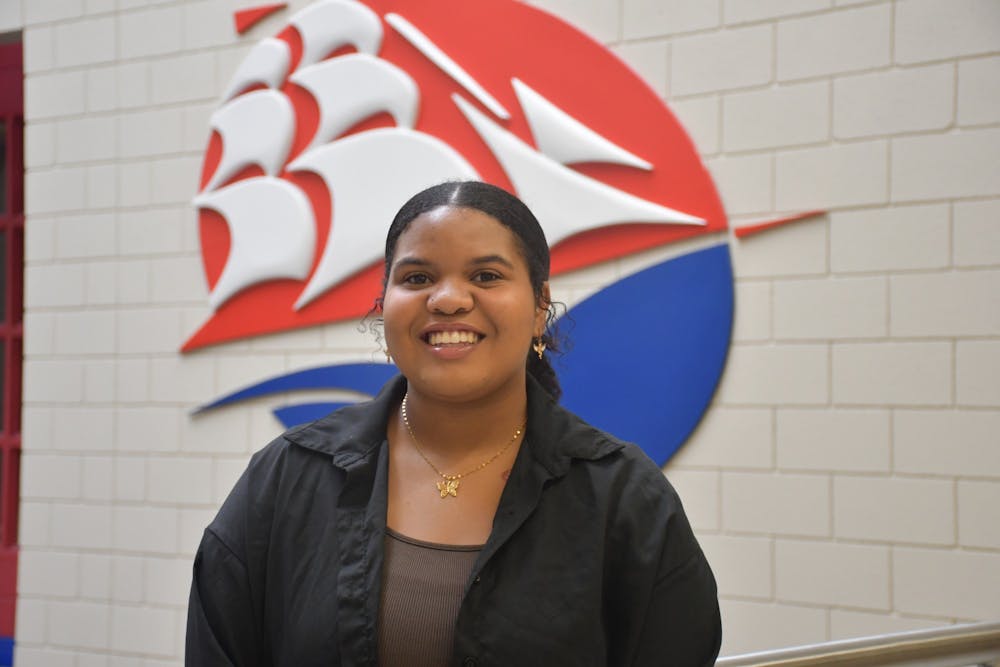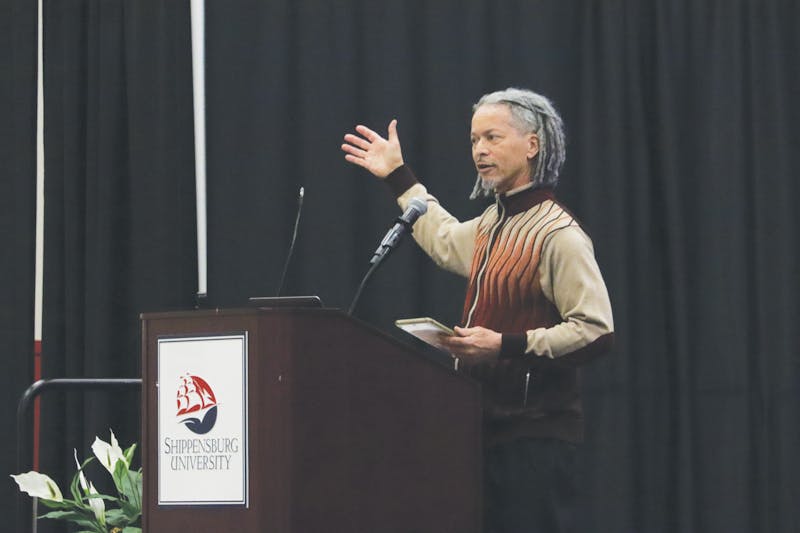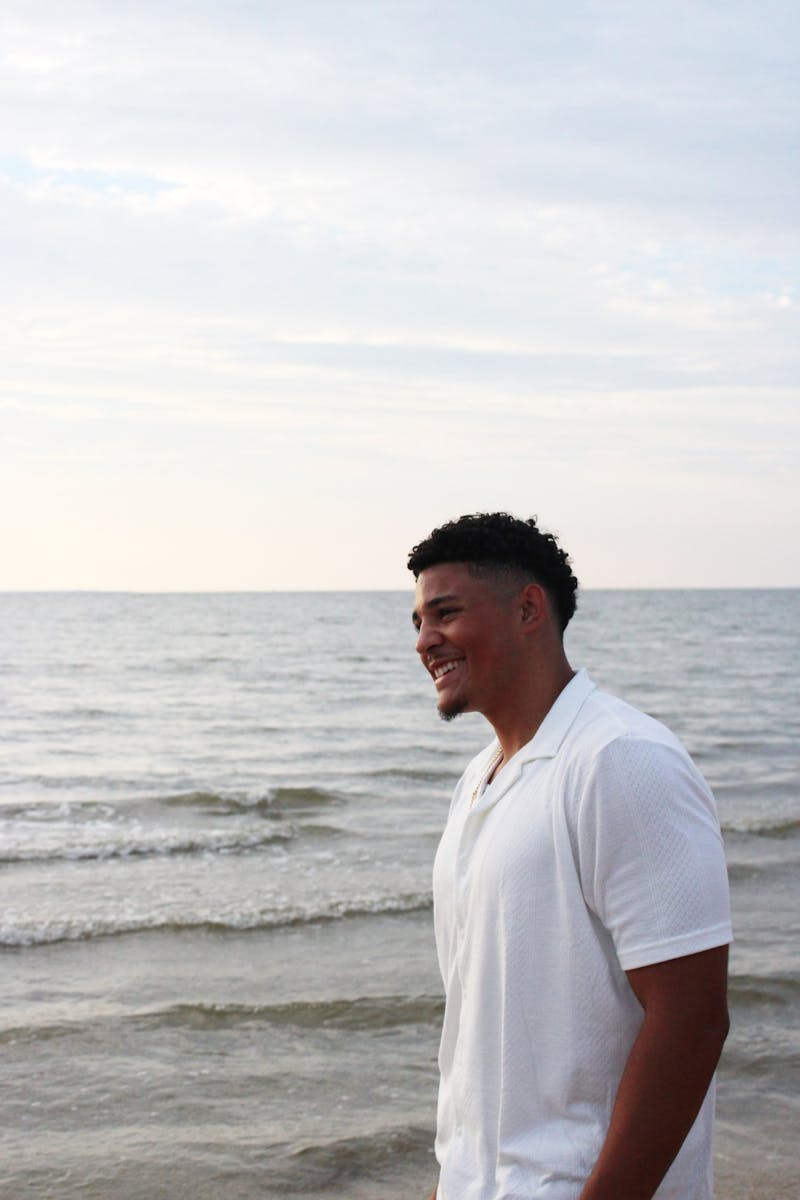Enlightening campus with societal perspective one article at a time, Monika Lewis has made waves as an opinion editor for the Slate as she yearns to enact change on campus through the mediums of writing as well as politics. Lewis is a senior political science major at Shippensburg University, and after formerly attending Bridgewater College in Virginia, she followed her cousin to SU after COVID in pursuit of her current major.
Lewis said she initially wanted to be a lawyer, and I could not help but compare her tenacity paired with the hints of pink throughout her outfit to the energy of “Legally Blonde” icon Elle Woods. She tells me that she was drawn to the major of political science because of her fascination with various cases. Upon asking her what changes she would make to today’s political climate if given the chance, the gears in Lewis’ mind immediately began to turn.
“We are very partisan, and I feel like people are either on one side or the other, and each side thinks the other is wrong. There are things that we can come to an agreement with, but the stances that people identify with get in the way of the real issues.”
MS: “What would you say the real issues would be?”
ML: “I think the environment, for sure. There’s a lot of systematic issues as well. Everything that happened with Tyre Nichols should be handled on an executive level, and when it comes to international politics, there are lots of issues happening outside of America where our country has the opportunity to make real change, and we don’t. It gets very murky.”
MS: “What changes do you think you would make if you had that power?”
ML: “I feel that it is very reflective in my writing that there is a very real race issue on campus. Not saying that the entire campus is racist, but there are instances that happen to minority students — specifically Black students — that get overlooked. Then when the spotlight is shone on these issues, it seems more performative than effective. I want to see some type of change in the curriculum where we teach students about race and microaggressions.
To take it a step further, I know the campus will be holding many events for Black History Month this month, but once the events are over and the students who want to attend show up, then what? I feel like those events alone aren’t enacting the change that is needed. What about the people who don’t show up who need to show up? At the MLK March for Humanity, I know it was mandatory for some students to attend for their classes, and the SGA senators were required to go as well. It made me question if people were going because they wanted to or because they had to. When events are held that are not mandatory, the people who want to be there certainly show up, but it seems to me that those who need to be there aren’t there.”
I bring up the quilt unveiling event for the office of Multicultural Student Affairs (MSA) that I attended last semester, which was exciting and enriching for all in attendance, though it occurred to me that it was not promoted to students as much as it should have been.
MS: “Those kinds of events shouldn’t be catered exclusively to students who are part of MSA, because that’s what our entire campus encompasses. I definitely agree that there are some people that have not yet been fully educated on the things they need to know.”
ML: “I agree. I feel like the neglect of that opportunity would be setting that person up for failure, too. A person who is not a person of color may find their life expanding beyond an area such as Shippensburg, possibly an area with a higher population of Black people or Hispanic people. Maybe they wouldn’t know the right ways to operate around them at that point, but we were here at Shippensburg the whole time. No one is showing them the proper ways to interact with them, or they’re making the conscious choice not to learn how to coexist with those people.”
MS: “Which is really a core aspect of the college experience.”
ML: “Exactly. People may find themselves in a job where they may be in the minority, and they could end up getting in trouble by doing something offensive because of their willingness to remain sheltered.”
I shared with Monika my experience taking the University 101 First Year Seminar, in which there was an effective presentation on proper vocabulary and ways to respect people who belong to the LGBTQ+ community. We both agree that our campus would greatly benefit from having a similar course be implemented into courses that are mandatory for students.
ML: “I will say, I sometimes understand students’ hesitation to go to events like those. I am not part of the LGBTQ+ community, but I see the PAGE Center sometimes holds events that may educate me on things I don’t know. I know that I probably should go so that I can get a better understanding of what they’re going through, but I get the feeling that I shouldn’t be there because I don’t belong to that community. I feel like an outsider, and that’s the problem right there: rather than seeing myself as an outsider, I should want to go so that I can make connections with people who aren’t like me.”
I was drawn to sit down with Monika because I was inspired by many of the articles she had published during her time at The Slate. Upon asking her what brought her to start writing for the newspaper, she shared with me that last spring, she was in a class with a professor who had used the N-word.
“I hit a wall,” Lewis said. “There was a point where I had stopped showing up to class because I felt uncomfortable. I felt like I wasn’t given the help and support that I needed from the resources I was given. The office I was advised to reach out to had never gotten back to me after emailing and calling them.”
She then said that her adviser had helped her through that time. “She handled it like no one else did. She asked me if I was OK and validated the hurt I felt. It wasn’t until she stepped in that things began to change. I think that change happened because she was very adamant about action. She told me I should take this to the newspaper, and after processing most of what happened, I wrote my first piece for the Slate, ‘Black in the Classroom.’”
Monika also confronted the professor who had used the slur. “I was just trying to get to the ‘why,’” she tells me. “Why did you feel the need to use that word, and I need you to understand my ‘why,’ as in why you shouldn’t use it. They then responded that they used the word in an attempt to get a reaction out of the white students in the class. It was only offensive to one person in the room, and that was me.”
MS: “I’m so sorry you had to go through that. Genuinely.”
“It’s OK,” Monika says. “It happens.”
She is, unfortunately, no stranger to such instances, sharing with me that she had previously experienced the N-word leisurely thrown at she and her cousin by a student. “It’s here. But you’re not going to know that it’s here because no one’s talking about it. And when we do talk about it, it’s with each other, not the people who need to hear it. I won’t say that I’m glad the situation happened, because I could have lived without it. But it helped me find my footing and made me realize, ‘Okay, this is an actual problem. So, what are you going to do about it?’”
Monika is graduating this spring and has previously shared with me that she has been drawn to the idea of pursuing grad school and exploring international relations.
“The relationship with other countries is very important,” she tells me. “The UN, for instance, focuses on all countries together and how they can work to solve problems.”
I ask her if she were to walk away from Shippensburg University with one problem solved, what do you think that would be? “I feel like the school preaches diversity, equity, and inclusion, but that’s not necessarily what I’ve seen.”
We briefly poke fun at the minimal effect of the signs posted around campus that read in bold lettering, “HATE HAS NO HOME HERE.”
ML: “Many schools advertise themselves to be inclusive and diverse, but in my experience, it doesn’t always reflect that. I think Shippensburg is a very good school. I’ve had some amazing professors, I’ve met amazing people, I’ve had amazing opportunities thanks to the school I attend. I don’t want that to be overshadowed by the fact that some students are not supported here.”
In the short time I have known her, I look up to Monika’s ability to take the negative experiences she has had and allow them to inspire her to enact a change within her community. Among discussing various issues on campus, we were also able to bond over our love for our favorite musician, Taylor Swift. “I’ve always been a fan of hers, and people would make fun of me. As kids, we can easily get bullied out of liking something, but I stood my ground. I was like, no, she’s a freaking genius. I love how she’s doing the re-recordings as well; I find that very empowering. Someone took something from her, and now she’s taking it back in her own way.”
I smile at the similarities between the global pop star and the harbinger of change sitting in front of me.




The Slate welcomes thoughtful discussion on all of our stories, but please keep comments civil and on-topic. Read our full guidelines here.